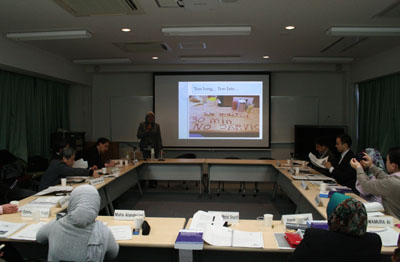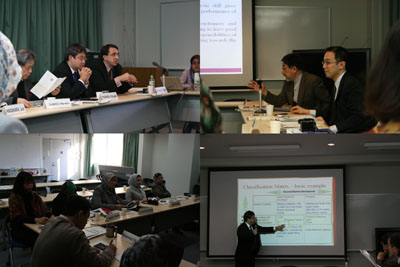
-
5th Kyoto-Durham International Workshop in Islamic Economics and Finance: New Horizons in Islamic Economics
(2012年2月11-12日 於京都大学)
タイトル:"Critical Perspectives on the Financial and Social Performance of Islamic Finance"
【プログラム】
[Date and Venue]
Day 1: 13:00 - 17:40, 11 February 2012
DAY 2: 11:15 - 16:00, 12 February 2012
Venue: Meeting Room (447) on 4th floor of Research Bldg. No.2, Yoshida Main Campus, Kyoto University
[Language]
English
[Organizers]
Kyoto University Global COE Program: In Search of Sustainable Humanosphere in Asia and Africa
NIHU Program, Islamic Area Studies: Center for Islamic Area Studies at Kyoto University (KIAS)
Grant-in- Aid for Scientific Research (A) "Revival of Religion, Technology and Bioethics in the Indian Ocean Area"
Durham Centre for Islamic Economics and Finance, Durham University, UK.
[Program]
DAY1
13:00-13:15: Opening Remarks
13:15-14:45: Keynote Session I
Keynote Speech 1
Mehmet Asutay (Durham University)
"Does Islamic Finance Make the World Safer? Assessing Financial and Social Performance"
Keynote Speech 2
Etsuaki Yoshida (Japan Bank for International Cooperation)
"Classifying Islamic Financial Markets: Dimensions and Japan's Positioning"
15:00-16:10: Session I: Performance and Prospect of Islamic Finance in Southeast Asia
Jaizah Othman (Durham University)
"Predicting Banking Distress Using Emerging Market Z"-Score Model: A Comparative Study on Islamic and Conventional Banks in Malaysia"
Hanira Hanafi (Durham University)
"Challenges of Having Genuinely Debt Based Financing of Islamic Mortgage: A Case of Musharakah Mutanaqisah Home Financing in Malaysia"
16:30-17:40: Session II: Performance and Prospect of Islamic Finance in Southeast Asia-2
Ros Aniza Mohd Shariff (Durham University)
"Service Quality, Customers Satisfaction and Awareness of Islamic and Conventional Banking in Malaysia"
Shifa Mohd Nor (Durham University)
"An Exploration of Social and Financial Performance of Islamic Banks in Malaysia"
DAY2
09:45-10:30: Keynote Session II
Yasushi Kosugi (Kyoto University)
"From Shari'a-Compliance to Shari'a-Based Islamic Economic System: A Proposal"
10:45-12:30: Session III: Economic Development and Islamic Finance in the Middle East
Maha Alandejani (Durham University)
"Examining the Performance and Productive Efficiency of Islamic and Conventional Banks in Saudi Arabia"
Jun Hagihara (Kyoto University)
"Domestic Energy Policy in Saudi Arabia: Focusing Power Sector"
Ai Kawamura (Kyoto University)
"Evaluating the Current Banking System and Dispute Resolution: The Case of Islamic Finance in the United Arab Emirates and Malaysia"
14:00-15:10: Session IV: New Horizons in Islamic Economics and Finance
Shinsuke Nagaoka (Kyoto University)
"Islamic Economics in the Second Decade of the 21st Century: Revival of Mudaraba Consensus or New Horizons?"
Rahmatina A. Kasri (Durham University)
"Can Financial and Social Performance of Zakah Institution be Assessed Using the Maqasid al-Shariah Approach?"
15:30-16:40: Session V: New Horizons in Islamic Economics and Finance-2
Muhammad Hakimi(Kyoto University)
"Agricultural Product and Loss Sharing (aPLS) as A New Formulation in Islamic Finance for Agriculture"
16:40-17:00: Closing Remarks


This fifth workshop in an annual series was held to mark the collaboration between Kyoto University and Durham University in the UK in studies on Islamic economic and financial issues, workshops that have been held since 2007.
The workshop began with two keynote speeches on the first day. The first was delivered by Dr. Mehmet Asutay on the subject of "Does Islamic Finance Make the World Safer? Assessing Financial and Social Performance." Mr. Etsuaki Yoshida from the Japan Bank for International Cooperation gave the second keynote speech, "Classifying Islamic Financial Markets: Dimensions and Japan's Positioning."
Dr. Mehmet highlighted that Islamic finance is based on a foundation of Islamic moral economy in banking and, accordingly, he emphasized that the moral screening process is one of the main components in filtering Islamic banking and finance, working in concert with Shari'a sources such as al-Quran and the Sunnah. He also argued that the realities of Islamic finance are much different than the aspirations for an Islamic moral economy, and that the promises and the reality of Islamic finance are divergent. He also found that Islamic finance is directly affected by monetary and business cycles, because the nature of their operations is very close to conventional finance, so he urged Islamic financial leaders to consider 'going back to the basics,' and making these aspirations an essential aspect of their operations.
Mr. Etsuaki Yoshida's presentation dealt with possible frameworks for country classifications of Islamic financial markets that may enable greater variety and depth of understanding when analyzing Islamic financial markets globally. He described several basic dimensions for classifying Islamic financial markets, such as Islamic and non-Islamic countries, non-Islamic countries that nevertheless have a certain Muslim population, non-Islamic countries with few Muslims, developed financial markets, emerging financial markets, wholesale operations, retail operations, and countries with banking-based capital, and those with market-based economies. He also touched on a number of important issues, such as the entry of newcomers, comparative factors among different religions, the dimension of common law, factors concerning leadership in small countries, and also the dimension of Shari'a schools (madhhab).

On the second day, Prof. Kosugi Yasushi delivered his keynote speech, "From Shari'a-Compliance to Shari'a-Based Islamic Economic System: A Proposal." His speech continued a theme explored in the previous workshop (the 4th Kyoto-Durham International Workshop in 2010), and examined the linkage between Islamic revival and Islamic economic activities. He discussed the prospects of Islamic economic interests that can transition from Shari'a-compliance toward a Shari'a-based Islamic economic system. He also expressed his opinion that Islamic economics must expand its domains, based on a broader view of Shari'a, so that it can become a science that is applicable to all economic fields in any given Islamic society.
In addition to the keynote speeches, four speakers from Kyoto University and six speakers from Durham University gave presentations during the International Workshop. Attendees enjoyed listening to Dr. Shinsuke Nagaoka, Muhammad Hakimi Mohd Shafiai, Jun Hagihara, and Ai Kawamura from Kyoto University, and Hanira Hanafi, Jaizah Othman, Ros Aniza Mohd Shariff, Shifa Mohd Nor, Maha Alandejani, and Rahmatina A. Kasri from Durham University. The topics of their presentations covered a lot of ground, ranging from an empirical examination of the performance of Islamic banks to the possibility of Zakat institutions in contemporary Indonesia. Despite the variety of research topics, they shared common aims: to explore the frontier of Islamic economics and finance, and to contribute not only to improvements in the practice of Islamic finance, but also to a more comprehensive understanding of the distinctive features of the Islamic economic system in our current era of globalization.
報告者:Muhammad Hakimi Mohd Shafiai (京都大学大学院アジア・アフリカ地域研究研究科)



















